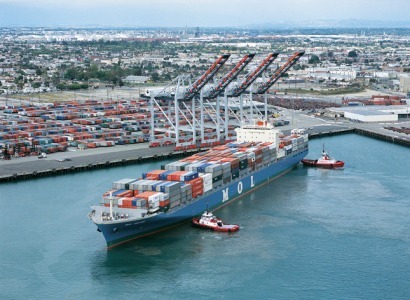
Ports can use the free Carbon Calculator to compute the amount of carbon dioxide emissions from sources associated with their operations, including port-specific sources such as cargo handling equipment and harbor craft. Armed with that information, ports can zero in on how best to reduce their carbon footprint through the calculator’s Reduced Emissions Scenarios feature.
“The Carbon Calculator is a powerful tool to help each port chart its own course toward reducing greenhouse gases,” said Port Executive Director Geraldine Knatz, Ph.D., who also serves as President of the International Association of Ports and Harbors (IAPH). “A consistent methodology among ports will help us assess our global impact.”
The Carbon Calculator is a project of the World Ports Climate Initiative (WPCI) – an IAPH collaboration launched in 2008. The initiative is dedicated to identifying and promoting effective, sustainable practices and strategies for ports and harbors to improve air quality while remaining vital economic engines.
The Port of Los Angeles, one of 59 WPCI members, has taken the lead in developing the calculator. Facilitated through the IAPH, more than a dozen port authorities and organizations have been collaborating on this project through the WPCI’s Carbon Footprinting Subgroup.
The “calculator” is a software package that allows ports to estimate existing carbon dioxide emissions from direct, port-owned sources such as fleet vehicles, cranes, harbor craft and cargo handling equipment, and also indirect sources such as electricity purchased for the port-owned buildings and operations. It also serves as a planning tool that ports can use to compute the benefits of replacing or retrofitting equipment with systems or machines that run on green power.
The calculator can be adjusted to measure emissions in the metric or English systems. Planning scenarios can be tailored to a port’s emissions reduction needs or goals.
For a nominal cost of $450, a higher-end version of the WPCI’s free online Carbon Calculator is also available. This version allows users to save and export data. The one-time-only charge is intended to cover a portion of development costs.
The calculator builds on other WPCI projects, including the Port of Los Angeles-lead Carbon Footprinting for Ports Guidance Document, a resource for ports seeking to develop or improve their greenhouse gas inventories. Future projects under consideration include a similar calculator for terminal operations and a goods movement calculator to estimate greenhouse gas emissions of cargo from point of origin to point of delivery.
Like other WPCI projects, the Carbon Calculator also illustrates the international commitment among IAPH members to share best environmental practices.
.
“A handful of major ports have invested significant time and money in running cleaner operations,” said Fer Van De Laar, Director of WPCI and Managing Director of IAPH. “They are sharing that knowledge and experience with their colleagues for the health and welfare of the global community.”
For additional information:

